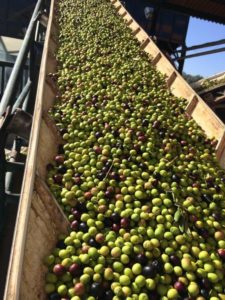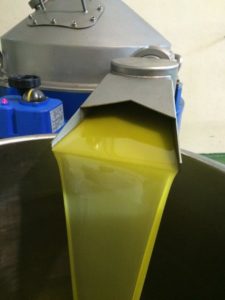Making the exceptional even more so with Marqués de Valdueza mill improvements
When you already make a world-class olive oil like Marqués de Valdueza, how do you go above and beyond and make the exceptional, well, even more exceptional? Let’s just say it’s kind of high-tech and it involves things like “milking” procedures, a tree-to-deposit milling system, friction reduction and improved horizontal and vertical centrifuges. In short, you never settle, you never stop asking, How can I make this better?
The Álvarez de Toledo family has owned the Perales estate in Extremadura, Spain and has been producing their Marques de Valdueza and Merula olive oils there for a little over 500 years. The site boasts a history rich with a 2,000 year-old-legacy of producing olive oil for “caesars, sultans, and kings uninterruptedly for two millennia.” There’s much more history there that involves a Byzantine emperor, Ferdinand and Isabel, Christopher Columbus, saints, poets, kings and conquistadores!
A story for another day, friends.
Back to the olive oil and the revolutionary mill improvements at Marqués de Valdueza!
Even with such an extraordinary inheritance and constant improvements, the Álvarez de Toledo family is not resting on their laurels.
 In the last year, these new improvements have been made to an already modern facility built on the Perales estate in 2004. Over a decade ago, the newly-constructed mill allowed for harvest and production techniques that had the olives handpicked and pressed within an hour. The result was the premier oil bottled as Marqués de Valdueza— a sharp, clean finishing oil made with the greener and less mature olives. This variety is expensive and offers low yields, but it is the source of the buttery mouth feel of Marqués de Valdueza’s olive oils. Next, after a few more days of maturing on the tree, the remaining olives are harvested to produce Merula. This slightly more mature oil has an open, subtle taste suited to combine flavors without overpowering them.
In the last year, these new improvements have been made to an already modern facility built on the Perales estate in 2004. Over a decade ago, the newly-constructed mill allowed for harvest and production techniques that had the olives handpicked and pressed within an hour. The result was the premier oil bottled as Marqués de Valdueza— a sharp, clean finishing oil made with the greener and less mature olives. This variety is expensive and offers low yields, but it is the source of the buttery mouth feel of Marqués de Valdueza’s olive oils. Next, after a few more days of maturing on the tree, the remaining olives are harvested to produce Merula. This slightly more mature oil has an open, subtle taste suited to combine flavors without overpowering them.
So, what do you do when you want to be the best at what you do? You bring in others who are the best at what they do.
Marqués de Valdueza brought in Javier Hidalgo, one of Spain’s premier experts in olive grove management. Hidalgo has assisted in reaching the perfect point of hydric stress and pruning for the olive trees which optimizes the flavor and aroma of the oils.
Marqués de Valdueza has also hired the prominent olive oil consultant, CITOLIVA, whose director Mari Paz Aguilera is considered the best olive oil taster in Spain today. Aguilera has been on tasting panels around the world including international contests in Los Angeles and New York.
Heeding the expert advice of Hidalgo and Aguilera, the groves’ irrigation and fertilization processes have been modified in a way to stress the trees adequately. The hand-picking—or “milking”—of the trees eliminates the vibrations of mechanical harvest. And only a quantity will be picked that can be immediately crushed and processed; this means zero wait-time at the mill!
It doesn’t get much fresher than that. This is called a “just-in-time” harvesting procedure which allows for a continual “tree-to-deposit” milling system. The olives do not sit in storage in collection bins—not even for matter of minutes!
What other measures have been taken at the mill?
Well, the mill itself is now attached to the wall of the plant which reduces the length of the pipes which move the mash inside from 15 to 1.5 meters. This reduction in length eliminates friction and in turn avoids heating the mash and possible subsequent fermentation.
Stay with me! There’s more. Seriously, this is down to a science.
Next, there is an innovation system in the blenders used to cool the mash. While most millers heat the mash to extract the maximum amount of oil, Marqués de Valdueza will be extracting oil from the mash in one of the few, truly cold processes on the market today. It is true this cold process extracts less oil, but it will be markedly better-tasting and, above all, it will retain all of its natural healthful properties.
And there’s moooore!
The horizontal centrifuge, which was already replaced and improved last year, and the vertical centrifuge have been adapted to the new cooling system. This means exposure to air and possible oxidation has been all but eliminated. From the vertical centrifuge, the oil goes into two new 10,000 liter stainless steel tanks. This allows the oil to decant immediately and give it a first filtering, removing organic residue and humidity which could negatively impact the quality of the oil during the long decanting process in the storage tanks. This modification removes all the possible critical points at which point either aerobic or anaerobic fermentation could occur. At the Marqués de Valdueza plant, they have also closed the pomace waters and waste mash in hermetic conduits. This step removes the possibility of contamination from the odors of these by-products.
What does this all mean? What is the result of the mill improvements that have taken lots of time, passion and money?
Well, it’s a crisper, fresher oil with more stable attributes—meaning an oil that stays fresh and true in flavor throughout the distribution process.
What I’m trying to say is that it will taste really, really good when it arrives in your hands! Just as good as the day it left the mill. And it will maintain all of the health benefits, too!
You don’t need to worry about centrifuges, “mash,” and hermetic conduits— Marqués de Valdueza has done that for you.
You just get to enjoy the fruits of their labor and crack open a bottle, or tin, of their finest olive oil!
Written by Leska Tomash